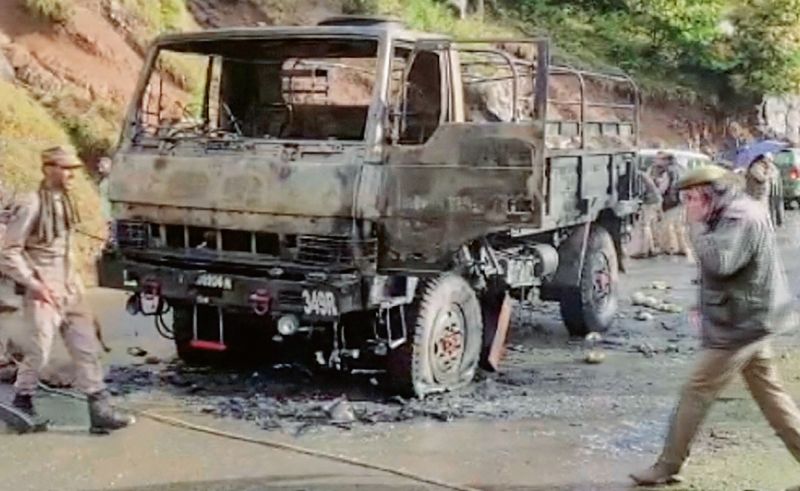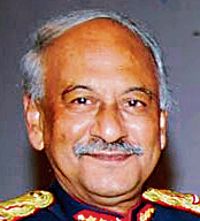
t is time Pakistan started paying for the death of every soldier or civilian murdered on our side. Short of declaring a war, we need to immediately initiate the following moves: dump the peace and tranquillity agreement and reactivate the entire LoC; carry out effective and sustained fire assaults; destroy military infrastructure behind the LoC; and strengthen our ground-level and electronic intelligence surveillance.

The killing of five soldiers by terrorists in Poonch district on April 20 has again turned the spotlight on the Army’s role in Jammu and Kashmir and the machinations of our hostile neighbour. What is required is a rapid rethink of our Pakistan policy and the initiation of immediate counter-operations.
The humiliation of the 1971 defeat and the abject surrender are deeply rooted in the psyche of the Pakistan army. Coupled with this is India’s rapid ascendancy towards becoming a powerful international and economic democratic power vis-à-vis Pakistan’s status of a failed, bankrupt state. All this rankles so badly that the Pakistani military will never cease to carry out attacks against us. Terrorist camps will continue to flourish across the Line of Control (LoC) and no sporadic surgical strikes or Balakot-like airstrike will wipe them out.
During 2000-02, while I was commanding a brigade in the volatile Pallanwala sector of Akhnoor, there was an undeclared war being waged all along the LoC. Thousands of rounds of rifle and machine-gun fire were exchanged every night; mortars regularly pounded each other’s posts as well as civilian areas, forcing the villagers into refugee camps while snipers lay in wait to blow off the head of any soldier who exposed himself for even a few seconds. Border Action Teams (BATs), trained, equipped and supported by the Pakistani army, were permanently located in their forward posts, watching and mapping all our movements and routine. On a moonless night, they would cross the LoC through thick sarkanda grass to either lay an ambush and plant anti-personnel mines in our trenches or disappear into our jungles in the hinterland. There was no border fencing in those days and the Indian Army was in a perpetual state of high alert across every inch of the LoC, day in and day out.
However, we always gave it back to the enemy in greater measure. We had larger stockpiles of ammunition and our senior commanders gave us a free hand to plan offensive actions. We had highly motivated young officers and men, dynamic commanding officers and trained Ghatak (Commando) platoons, which executed shallow ‘surgical strikes’ across the LoC. Our mortars targeted villages such as Chhamb, which had once belonged to us but were allowed to be retained by Pakistan after the 1971 war.https://b7a4cc0213bb5b290f0672e7be3311c4.safeframe.googlesyndication.com/safeframe/1-0-40/html/container.html
Reports of high Pakistani military casualties were received by us from time to time, especially due to the volume and effectiveness of our long-range weapons. Many terrorists were eliminated along the LoC. The only offensive asset we lacked was the unending pool of expendable, brainwashed youth from various Islamic countries who were sent across to launch BAT attacks or enter our hinterland to wage a war against India. However, raids and quick attacks across the LoC by our troops ensured that the Pakistani soldier on the forward posts also could not sleep in peace.
In November 2003, the guns fell silent as a peace and tranquillity agreement between the two nations came into force. The Pakistani army rejoiced. It got a much-needed breather and was now able to repair its damaged forward defences with impunity, prepare fresh logistics and operational infrastructure and go on leave to their families. In summation, the enemy was allowed to get back to a peaceful, routine level of activity, while our troops continued to remain at the same level of high alert, both along the LoC and in the hinterland. Over the next 20 years, Pakistanis have been waging a brutal war against India. The recent killing of our five soldiers was just one of the many dastardly actions by them.
It is time Pakistan started paying for the death of every soldier or civilian murdered on our side. Short of declaring a war, we need to immediately initiate the following moves: dump the peace and tranquillity agreement and reactivate the entire LoC; carry out effective and sustained fire assaults, especially on those Pakistani posts which harbour, guide and induct terrorists to carry out BAT actions or attacks in the hinterland; destroy military infrastructure behind the LoC, especially ammunition, communication, fuel, food, transport and radar centres, using drones and other means at our disposal; strengthen our ground-level and electronic intelligence surveillance; penetrate their communication networks and obtain hard intelligence on a continuous basis. Most importantly, our intelligence agencies must immediately start creating and training a force of motivated irregulars (maybe mercenaries) to operate in the Pakistani hinterland in the same manner as their jihadis and BATs do in ours.
The time to remain passive is gone. It is time for action, proactive action, action that will undermine the will, morale, sustenance and infrastructure of a rogue army. This is the time to do it, with the Pakistani economy and political leadership in turmoil, besides the likelihood of low holdings of ammunition and degraded condition of war-fighting equipment. Let us reactivate the LoC now and carry the battle across into their side rather than fight a defensive, disadvantageous battle on our side. Let us not bleed any more, let us bleed them, and profusely at that.
